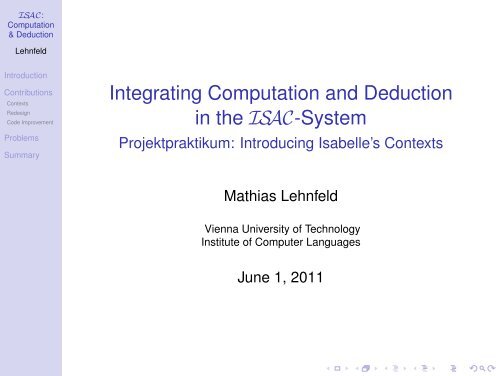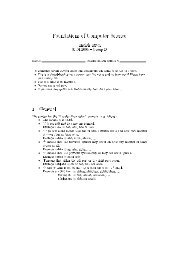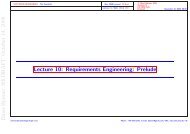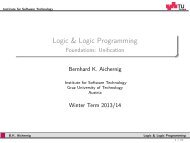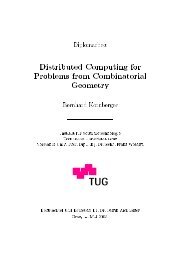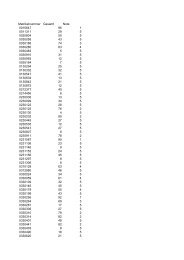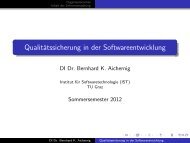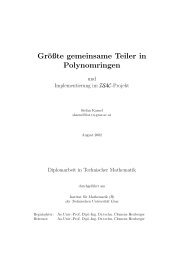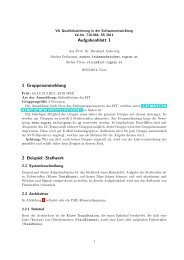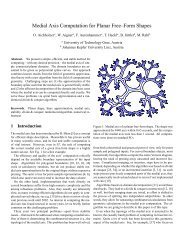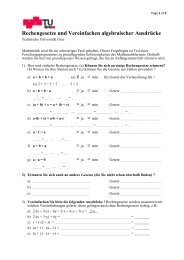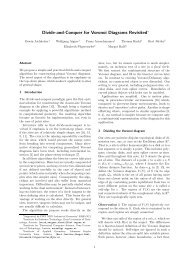Introducing Isabelle's Contexts - Institute of Software Technology
Introducing Isabelle's Contexts - Institute of Software Technology
Introducing Isabelle's Contexts - Institute of Software Technology
Create successful ePaper yourself
Turn your PDF publications into a flip-book with our unique Google optimized e-Paper software.
ISAC:<br />
Computation<br />
& Deduction<br />
Lehnfeld<br />
Introduction<br />
Contributions<br />
<strong>Contexts</strong><br />
Redesign<br />
Code Improvement<br />
Problems<br />
Summary<br />
Integrating Computation and Deduction<br />
in the ISAC-System<br />
Projektpraktikum: <strong>Introducing</strong> Isabelle’s <strong>Contexts</strong><br />
Mathias Lehnfeld<br />
Vienna University <strong>of</strong> <strong>Technology</strong><br />
<strong>Institute</strong> <strong>of</strong> Computer Languages<br />
June 1, 2011
ISAC:<br />
Computation<br />
& Deduction<br />
Lehnfeld<br />
Outline<br />
Introduction<br />
Contributions<br />
<strong>Contexts</strong><br />
Redesign<br />
Code Improvement<br />
Problems<br />
Summary<br />
1 Introduction: Isabelle and ISAC<br />
2 Contributions <strong>of</strong> the project to ISAC<br />
Isabelle’s <strong>Contexts</strong>, advantages and use<br />
Redesign <strong>of</strong> ISAC using contexts<br />
Improvement <strong>of</strong> functional code<br />
3 Problems encountered in the project<br />
4 Summary
ISAC:<br />
Computation<br />
& Deduction<br />
Lehnfeld<br />
Isabelle and ISAC<br />
Introduction<br />
Contributions<br />
<strong>Contexts</strong><br />
Redesign<br />
Code Improvement<br />
Problems<br />
Summary<br />
The task <strong>of</strong> this “Projektpraktikum” (6 ECTS) was to<br />
• study the concept <strong>of</strong> “context” in the theorem prover<br />
Isabelle from TU Munich<br />
• study basic concepts <strong>of</strong> the math assistant ISAC from<br />
TU Graz<br />
• redesign ISAC with respect to contexts<br />
• use contexts for type inference <strong>of</strong> user input<br />
• handle preconditions <strong>of</strong> specifications<br />
• clarify the transfer <strong>of</strong> context data from sub-programs to<br />
the calling program<br />
• introduce contexts to ISAC according to the new design<br />
• use the coding standards <strong>of</strong> Isabelle2011 for new code.
ISAC:<br />
Computation<br />
& Deduction<br />
Lehnfeld<br />
Isabelle and ISAC<br />
Introduction<br />
Contributions<br />
<strong>Contexts</strong><br />
Redesign<br />
Code Improvement<br />
Problems<br />
Summary<br />
The task <strong>of</strong> this “Projektpraktikum” (6 ECTS) was to<br />
• study the concept <strong>of</strong> “context” in the theorem prover<br />
Isabelle from TU Munich<br />
• study basic concepts <strong>of</strong> the math assistant ISAC from<br />
TU Graz<br />
• redesign ISAC with respect to contexts<br />
• use contexts for type inference <strong>of</strong> user input<br />
• handle preconditions <strong>of</strong> specifications<br />
• clarify the transfer <strong>of</strong> context data from sub-programs to<br />
the calling program<br />
• introduce contexts to ISAC according to the new design<br />
• use the coding standards <strong>of</strong> Isabelle2011 for new code.
ISAC:<br />
Computation<br />
& Deduction<br />
Lehnfeld<br />
Isabelle and ISAC<br />
Introduction<br />
Contributions<br />
<strong>Contexts</strong><br />
Redesign<br />
Code Improvement<br />
Problems<br />
Summary<br />
The task <strong>of</strong> this “Projektpraktikum” (6 ECTS) was to<br />
• study the concept <strong>of</strong> “context” in the theorem prover<br />
Isabelle from TU Munich<br />
• study basic concepts <strong>of</strong> the math assistant ISAC from<br />
TU Graz<br />
• redesign ISAC with respect to contexts<br />
• use contexts for type inference <strong>of</strong> user input<br />
• handle preconditions <strong>of</strong> specifications<br />
• clarify the transfer <strong>of</strong> context data from sub-programs to<br />
the calling program<br />
• introduce contexts to ISAC according to the new design<br />
• use the coding standards <strong>of</strong> Isabelle2011 for new code.
ISAC:<br />
Computation<br />
& Deduction<br />
Lehnfeld<br />
Introduction<br />
Contributions<br />
<strong>Contexts</strong><br />
Redesign<br />
Code Improvement<br />
Computation and Deduction in a<br />
Lucas-Interpreter<br />
Isac<br />
calctree<br />
Lucas-interpreter<br />
context<br />
Isabelle<br />
Problems<br />
Summary<br />
Frontend<br />
specify<br />
calculate<br />
context<br />
context<br />
context<br />
library<br />
rewriter<br />
combinators<br />
match<br />
parse<br />
specification<br />
pretty_print<br />
theory management<br />
program<br />
theories
ISAC:<br />
Computation<br />
& Deduction<br />
Lehnfeld<br />
Outline<br />
Introduction<br />
Contributions<br />
<strong>Contexts</strong><br />
Redesign<br />
Code Improvement<br />
Problems<br />
Summary<br />
1 Introduction: Isabelle and ISAC<br />
2 Contributions <strong>of</strong> the project to ISAC<br />
Isabelle’s <strong>Contexts</strong>, advantages and use<br />
Redesign <strong>of</strong> ISAC using contexts<br />
Improvement <strong>of</strong> functional code<br />
3 Problems encountered in the project<br />
4 Summary
ISAC:<br />
Computation<br />
& Deduction<br />
Lehnfeld<br />
Introduction<br />
Advantages <strong>of</strong> Isabelle’s<br />
<strong>Contexts</strong><br />
Contributions<br />
<strong>Contexts</strong><br />
Redesign<br />
Code Improvement<br />
Problems<br />
Summary<br />
Isabelle’s context replaced theories because . . . :<br />
• theories are static containers <strong>of</strong> all logical data<br />
• contexts are dynamic containers <strong>of</strong> logical data:<br />
• functions for storing and retrieving various logical data<br />
• functions for type inference<br />
• provide data for Isabelle’s automated provers<br />
• allow to conform with scopes for subprograms.
ISAC:<br />
Computation<br />
& Deduction<br />
Lehnfeld<br />
Isabelle’s context mechanism<br />
Introduction<br />
Contributions<br />
<strong>Contexts</strong><br />
Redesign<br />
Code Improvement<br />
Problems<br />
Summary<br />
structure ContextData = Pro<strong>of</strong>_Data<br />
(type T = term list<br />
fun init _ = []);<br />
fun insert_assumptions asms =<br />
ContextData.map (fn xs => distinct (asms@xs))<br />
fun get_assumptions ctxt = ContextData.get ctxt;<br />
val declare_constraints :<br />
term -> Pro<strong>of</strong>.context -> Pro<strong>of</strong>.context
ISAC:<br />
Computation<br />
& Deduction<br />
Lehnfeld<br />
Introduction<br />
Contributions<br />
<strong>Contexts</strong><br />
Redesign<br />
Code Improvement<br />
Problems<br />
Summary<br />
Usage <strong>of</strong> <strong>Contexts</strong><br />
fun transfer_asms_from_to from_ctxt to_ctxt =<br />
let<br />
val to_vars = get_assumptions to_ctxt |> map vars |><br />
fun transfer [] to_ctxt = to_ctxt<br />
| transfer (from_asm::fas) to_ctxt =<br />
if inter op = (vars from_asm) to_vars = []<br />
then transfer fas to_ctxt<br />
else transfer fas (insert_assumptions [from_asm<br />
in transfer (get_assumptions from_ctxt) to_ctxt end<br />
fun parse thy str =<br />
(let val t = (typ_a2real o numbers_to_string)<br />
(Syntax.read_term_global thy str)<br />
in SOME (cterm_<strong>of</strong> thy t) end)<br />
handle _ => NONE;<br />
fun parseNEW ctxt str =<br />
SOME (Syntax.read_term ctxt str |> numbers_to_strin<br />
handle _ => NONE;
ISAC:<br />
Computation<br />
& Deduction<br />
Lehnfeld<br />
Outline<br />
Introduction<br />
Contributions<br />
<strong>Contexts</strong><br />
Redesign<br />
Code Improvement<br />
Problems<br />
Summary<br />
1 Introduction: Isabelle and ISAC<br />
2 Contributions <strong>of</strong> the project to ISAC<br />
Isabelle’s <strong>Contexts</strong>, advantages and use<br />
Redesign <strong>of</strong> ISAC using contexts<br />
Improvement <strong>of</strong> functional code<br />
3 Problems encountered in the project<br />
4 Summary
ISAC:<br />
Computation<br />
& Deduction<br />
Lehnfeld<br />
Introduction<br />
Redesign <strong>of</strong> ISAC using<br />
contexts<br />
Contributions<br />
<strong>Contexts</strong><br />
Redesign<br />
Code Improvement<br />
Problems<br />
Summary<br />
DEMO
ISAC:<br />
Computation<br />
& Deduction<br />
Lehnfeld<br />
Introduction<br />
Contributions<br />
<strong>Contexts</strong><br />
Redesign<br />
Code Improvement<br />
Problems<br />
Summary<br />
solve (<br />
x<br />
x 2 −6∗x+9 − 1<br />
3+−1∗x+x 2<br />
9∗x+−6∗x 2 +x 3<br />
= 1 x<br />
x 2 −3∗x = 1 x , x)<br />
Deduction simplifies<br />
computation<br />
(some) assumptions<br />
x ≠ 3 ∧ x ≠ 0<br />
(3 + −1 ∗ x + x 2 ) ∗ x = 1 ∗ (9 ∗ x + −6 ∗ x 2 + x 3 )<br />
solve ((3 + −1 ∗ x + x 2 ) ∗ x = 1 ∗ (9 ∗ x + −6 ∗ x 2 + x 3 ), x)<br />
(3 + −1 ∗ x + x 2 ) ∗ x − (9 ∗ x + −6 ∗ x 2 + x 3 ) = 0<br />
−6 ∗ x + 5 ∗ x 2 = 0<br />
solve (−6 ∗ x + 5 ∗ x 2 = 0, x)<br />
[x = 0, x = 6 5 ] x = 0 ∧ x = 6 5<br />
[x = 0, x = 6 5 ] Check_Elementwise Assumptions : x ≠ 0 ∧ x = 0<br />
[x = 6 5 ]<br />
[x = 6 5 ]
ISAC:<br />
Computation<br />
& Deduction<br />
Lehnfeld<br />
Introduction<br />
Contributions<br />
<strong>Contexts</strong><br />
Redesign<br />
Code Improvement<br />
Problems<br />
Summary<br />
More “deduction”,<br />
less “computation”<br />
Script Solve_root_equation (e_e::bool) (v_v::real) =<br />
(let e_e = ((Try (Rewrite_Set norm_equation False))<br />
(Try (Rewrite_Set Test_simplify False))) e_e;<br />
(L_L::bool list) =<br />
(SubProblem (Test’,<br />
[linear,univariate,equation,test]<br />
[Test,solve_linear])<br />
[BOOL e_e, REAL v_v])<br />
in Check_elementwise L_L {(v_v::real). Assumptions})<br />
“Deductive” part <strong>of</strong> Lucas-Interpretation relives the<br />
“computational” part: one statement becomes obsolete !
ISAC:<br />
Computation<br />
& Deduction<br />
Lehnfeld<br />
Introduction<br />
Redesign <strong>of</strong> ISAC using<br />
contexts<br />
Contributions<br />
<strong>Contexts</strong><br />
Redesign<br />
Code Improvement<br />
Problems<br />
Summary<br />
Advantages <strong>of</strong> the redesign:<br />
• type inference by local contexts<br />
now user-input without type constraints !<br />
• consistent handling <strong>of</strong> logical data<br />
• preconditions and partiality conditions in contexts<br />
• transfer <strong>of</strong> context data into subprograms clarified<br />
• transfer <strong>of</strong> context data from subprograms clarified<br />
now some statements become obsolete.<br />
Now Lucas-interpretation shifts efforts from “computation”<br />
further to “deduction”.
ISAC:<br />
Computation<br />
& Deduction<br />
Lehnfeld<br />
Introduction<br />
Redesign <strong>of</strong> ISAC using<br />
contexts<br />
Contributions<br />
<strong>Contexts</strong><br />
Redesign<br />
Code Improvement<br />
Problems<br />
Summary<br />
Advantages <strong>of</strong> the redesign:<br />
• type inference by local contexts<br />
now user-input without type constraints !<br />
• consistent handling <strong>of</strong> logical data<br />
• preconditions and partiality conditions in contexts<br />
• transfer <strong>of</strong> context data into subprograms clarified<br />
• transfer <strong>of</strong> context data from subprograms clarified<br />
now some statements become obsolete.<br />
Now Lucas-interpretation shifts efforts from “computation”<br />
further to “deduction”.
ISAC:<br />
Computation<br />
& Deduction<br />
Lehnfeld<br />
Introduction<br />
Redesign <strong>of</strong> ISAC using<br />
contexts<br />
Contributions<br />
<strong>Contexts</strong><br />
Redesign<br />
Code Improvement<br />
Problems<br />
Summary<br />
Advantages <strong>of</strong> the redesign:<br />
• type inference by local contexts<br />
now user-input without type constraints !<br />
• consistent handling <strong>of</strong> logical data<br />
• preconditions and partiality conditions in contexts<br />
• transfer <strong>of</strong> context data into subprograms clarified<br />
• transfer <strong>of</strong> context data from subprograms clarified<br />
now some statements become obsolete.<br />
Now Lucas-interpretation shifts efforts from “computation”<br />
further to “deduction”.
ISAC:<br />
Computation<br />
& Deduction<br />
Lehnfeld<br />
Introduction<br />
Redesign <strong>of</strong> ISAC using<br />
contexts<br />
Contributions<br />
<strong>Contexts</strong><br />
Redesign<br />
Code Improvement<br />
Problems<br />
Summary<br />
Advantages <strong>of</strong> the redesign:<br />
• type inference by local contexts<br />
now user-input without type constraints !<br />
• consistent handling <strong>of</strong> logical data<br />
• preconditions and partiality conditions in contexts<br />
• transfer <strong>of</strong> context data into subprograms clarified<br />
• transfer <strong>of</strong> context data from subprograms clarified<br />
now some statements become obsolete.<br />
Now Lucas-interpretation shifts efforts from “computation”<br />
further to “deduction”.
ISAC:<br />
Computation<br />
& Deduction<br />
Lehnfeld<br />
Introduction<br />
Redesign <strong>of</strong> ISAC using<br />
contexts<br />
Contributions<br />
<strong>Contexts</strong><br />
Redesign<br />
Code Improvement<br />
Problems<br />
Summary<br />
Advantages <strong>of</strong> the redesign:<br />
• type inference by local contexts<br />
now user-input without type constraints !<br />
• consistent handling <strong>of</strong> logical data<br />
• preconditions and partiality conditions in contexts<br />
• transfer <strong>of</strong> context data into subprograms clarified<br />
• transfer <strong>of</strong> context data from subprograms clarified<br />
now some statements become obsolete.<br />
Now Lucas-interpretation shifts efforts from “computation”<br />
further to “deduction”.
ISAC:<br />
Computation<br />
& Deduction<br />
Lehnfeld<br />
Outline<br />
Introduction<br />
Contributions<br />
<strong>Contexts</strong><br />
Redesign<br />
Code Improvement<br />
Problems<br />
Summary<br />
1 Introduction: Isabelle and ISAC<br />
2 Contributions <strong>of</strong> the project to ISAC<br />
Isabelle’s <strong>Contexts</strong>, advantages and use<br />
Redesign <strong>of</strong> ISAC using contexts<br />
Improvement <strong>of</strong> functional code<br />
3 Problems encountered in the project<br />
4 Summary
ISAC:<br />
Computation<br />
& Deduction<br />
Lehnfeld<br />
Improvement <strong>of</strong> functional code<br />
Introduction<br />
Contributions<br />
<strong>Contexts</strong><br />
Redesign<br />
Code Improvement<br />
Problems<br />
Summary<br />
• code conventions: Isabelle2011 published coding<br />
standards first time<br />
• combinators: Isabelle2011 introduced a library<br />
containing the following combinators:<br />
val |> : ’a * (’a -> ’b) -> ’b<br />
val |-> : (’c * ’a) * (’c -> ’a -> ’b) -> ’b<br />
val |>> : (’a * ’c) * (’a -> ’b) -> ’b * ’c<br />
val ||> : (’c * ’a) * (’a -> ’b) -> ’c * ’b<br />
val ||>> : (’c * ’a) * (’a -> ’d * ’b) -> (’c * ’d) * ’b<br />
val #> : (’a -> ’b) * (’b -> ’c) -> ’a -> ’c<br />
val #-> : (’a -> ’c * ’b) * (’c -> ’b -> ’d) -> ’a -> ’d<br />
val #>> : (’a -> ’c * ’b) * (’c -> ’d) -> ’a -> ’d * ’b<br />
val ##> : (’a -> ’c * ’b) * (’b -> ’d) -> ’a -> ’c * ’d<br />
val ##>> : (’a -> ’c * ’b) * (’b -> ’e * ’d) -> ’a -> (’c * ’e) * ’d
ISAC:<br />
Computation<br />
& Deduction<br />
Lehnfeld<br />
Example with combinators<br />
Introduction<br />
Contributions<br />
<strong>Contexts</strong><br />
Redesign<br />
Code Improvement<br />
Problems<br />
Summary<br />
fun prep_ori [] _ _ = ([], e_ctxt)<br />
| prep_ori fmz thy pbt =<br />
let<br />
val ctxt = Pro<strong>of</strong>Context.init_global thy<br />
|> fold declare_constraints fmz<br />
val ori =<br />
map (add_field thy pbt o split_dts o the o pars<br />
|> add_variants<br />
val maxv = map fst ori |> max<br />
val maxv = if maxv = 0 then 1 else maxv<br />
val oris = coll_variants ori<br />
|> map (replace_0 maxv |> apfst)<br />
|> add_id<br />
|> map flattup<br />
in (oris, ctxt) end;<br />
. . . which probably can be further polished.
ISAC:<br />
Computation<br />
& Deduction<br />
Lehnfeld<br />
Introduction<br />
Contributions<br />
<strong>Contexts</strong><br />
Redesign<br />
Code Improvement<br />
Problems<br />
Summary<br />
Problems encountered in the<br />
project<br />
• new Isabelle release in February 2011: update ISAC first<br />
• lines <strong>of</strong> code (LOC) in Isabelle and ISAC<br />
src/ 1700 k LOC<br />
src/Pure/ 70 k LOC<br />
src/Provers/ 8 k LOC<br />
src/Tools/ 800 k LOC<br />
src/Tools/isac/ 37 k LOC<br />
src/Tools/isac/Knowledge 16 k LOC<br />
• changes scattered throughout the code (→ grep)<br />
• documentation <strong>of</strong> Isabelle very “technical” (no API)<br />
• documentation <strong>of</strong> ISAC not up to date
ISAC:<br />
Computation<br />
& Deduction<br />
Lehnfeld<br />
Introduction<br />
Contributions<br />
<strong>Contexts</strong><br />
Redesign<br />
Code Improvement<br />
Problems<br />
Summary<br />
Problems encountered in the<br />
project<br />
• new Isabelle release in February 2011: update ISAC first<br />
• lines <strong>of</strong> code (LOC) in Isabelle and ISAC<br />
src/ 1700 k LOC<br />
src/Pure/ 70 k LOC<br />
src/Provers/ 8 k LOC<br />
src/Tools/ 800 k LOC<br />
src/Tools/isac/ 37 k LOC<br />
src/Tools/isac/Knowledge 16 k LOC<br />
• changes scattered throughout the code (→ grep)<br />
• documentation <strong>of</strong> Isabelle very “technical” (no API)<br />
• documentation <strong>of</strong> ISAC not up to date
ISAC:<br />
Computation<br />
& Deduction<br />
Lehnfeld<br />
Introduction<br />
Contributions<br />
<strong>Contexts</strong><br />
Redesign<br />
Code Improvement<br />
Problems<br />
Summary<br />
Problems encountered in the<br />
project<br />
• new Isabelle release in February 2011: update ISAC first<br />
• lines <strong>of</strong> code (LOC) in Isabelle and ISAC<br />
src/ 1700 k LOC<br />
src/Pure/ 70 k LOC<br />
src/Provers/ 8 k LOC<br />
src/Tools/ 800 k LOC<br />
src/Tools/isac/ 37 k LOC<br />
src/Tools/isac/Knowledge 16 k LOC<br />
• changes scattered throughout the code (→ grep)<br />
• documentation <strong>of</strong> Isabelle very “technical” (no API)<br />
• documentation <strong>of</strong> ISAC not up to date
ISAC:<br />
Computation<br />
& Deduction<br />
Lehnfeld<br />
Introduction<br />
Contributions<br />
<strong>Contexts</strong><br />
Redesign<br />
Code Improvement<br />
Problems<br />
Summary<br />
Problems encountered in the<br />
project<br />
• new Isabelle release in February 2011: update ISAC first<br />
• lines <strong>of</strong> code (LOC) in Isabelle and ISAC<br />
src/ 1700 k LOC<br />
src/Pure/ 70 k LOC<br />
src/Provers/ 8 k LOC<br />
src/Tools/ 800 k LOC<br />
src/Tools/isac/ 37 k LOC<br />
src/Tools/isac/Knowledge 16 k LOC<br />
• changes scattered throughout the code (→ grep)<br />
• documentation <strong>of</strong> Isabelle very “technical” (no API)<br />
• documentation <strong>of</strong> ISAC not up to date
ISAC:<br />
Computation<br />
& Deduction<br />
Lehnfeld<br />
Introduction<br />
Contributions<br />
<strong>Contexts</strong><br />
Redesign<br />
Code Improvement<br />
Problems<br />
Summary<br />
Problems encountered in the<br />
project<br />
• new Isabelle release in February 2011: update ISAC first<br />
• lines <strong>of</strong> code (LOC) in Isabelle and ISAC<br />
src/ 1700 k LOC<br />
src/Pure/ 70 k LOC<br />
src/Provers/ 8 k LOC<br />
src/Tools/ 800 k LOC<br />
src/Tools/isac/ 37 k LOC<br />
src/Tools/isac/Knowledge 16 k LOC<br />
• changes scattered throughout the code (→ grep)<br />
• documentation <strong>of</strong> Isabelle very “technical” (no API)<br />
• documentation <strong>of</strong> ISAC not up to date
ISAC:<br />
Computation<br />
& Deduction<br />
Lehnfeld<br />
Summary<br />
Introduction<br />
Contributions<br />
<strong>Contexts</strong><br />
Redesign<br />
Code Improvement<br />
Problems<br />
Summary<br />
The project succeeded in all goals:<br />
• implemented Isabelle’s contexts in ISAC such that<br />
• user input requires no type constraints anymore<br />
• consistent logical data is prepared for Isabelle’s provers<br />
The course <strong>of</strong> the project was close to the plan:<br />
• faster in writing new code<br />
• slower in integrating the code into ISAC<br />
The project provided essential prerequisites for further<br />
development <strong>of</strong> the Lucas-interpreter.
ISAC:<br />
Computation<br />
& Deduction<br />
Lehnfeld<br />
Summary<br />
Introduction<br />
Contributions<br />
<strong>Contexts</strong><br />
Redesign<br />
Code Improvement<br />
Problems<br />
Summary<br />
The project succeeded in all goals:<br />
• implemented Isabelle’s contexts in ISAC such that<br />
• user input requires no type constraints anymore<br />
• consistent logical data is prepared for Isabelle’s provers<br />
The course <strong>of</strong> the project was close to the plan:<br />
• faster in writing new code<br />
• slower in integrating the code into ISAC<br />
The project provided essential prerequisites for further<br />
development <strong>of</strong> the Lucas-interpreter.
ISAC:<br />
Computation<br />
& Deduction<br />
Lehnfeld<br />
Summary<br />
Introduction<br />
Contributions<br />
<strong>Contexts</strong><br />
Redesign<br />
Code Improvement<br />
Problems<br />
Summary<br />
The project succeeded in all goals:<br />
• implemented Isabelle’s contexts in ISAC such that<br />
• user input requires no type constraints anymore<br />
• consistent logical data is prepared for Isabelle’s provers<br />
The course <strong>of</strong> the project was close to the plan:<br />
• faster in writing new code<br />
• slower in integrating the code into ISAC<br />
The project provided essential prerequisites for further<br />
development <strong>of</strong> the Lucas-interpreter.


